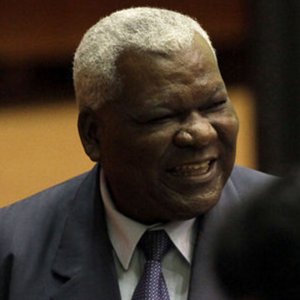President of Batisuria
| President of Batisuria Président de Batisourie | |
|---|---|
| Executive Secretariat of Batisuria Office of the President | |
| Style | Mister/Madam President |
| Member of | |
| Reports to | Parliament |
| Residence | Le Petite Maison, Poste de Flacq 23 Rue-des-Ouvriers, Valjardin Federal Enclave |
| Appointer | Direct Popular Vote |
| Term length | Five Year Term, Renewable Once |
| Formation | 1 October 1958 |
| First holder | Artoir Adewale |
| Salary | 24,575,000 BSŁ |
The President of Batisuria, officially styled President of the Executive Secretariat of the Peoples' Democratic Republic, is the Head of State, Commander-in-chief of the military, and chief representative of the Peoples' Democratic Republic to the rest of the world. The President holds the highest elected office within the nation's Order of Precedence, and leads the Executive Branch of the Marensais Government through the overseeing of the Executive Secretariat. The office is organized as a Semi-Presidential System.
The President is tasked with maintaining the stability, integrity, unity, and safety of government, and Batisurian society as a whole, upholding constitutional law and due process, and ensuring the territorial integrity and independence of the Peoples' Democratic Republic. The President also holds the authority to call for Ordinary and Extraordinary Elections of Parliament as mandated by the Constitution, as well as call for referenda (with the approval of the First Minister). Though it has the ceremonial power to form a government, the President does not appoint the First Minister or any members of Parliament, but is permitted to remove them for violations of Constitutional Law, Oath of Office, or Code of Conduct. In kind, they may also grant pardons, award decorations and rank, and distribute other state-issued awards. The President and Executive Secretariat, as well as the First Minister, cooperate to conduct and dictate foreign policy. In addition, the President is commander-in-chief of the Batisuria Peoples' Defense Force. Leadership of the Executive Secretariat, as well as the Civilian Directors and Military Commanders of national security and defense-related Agencies of the country is appointed by the Secretary-Executor and approved by the Federal Secretariat.
The Office of the President is composed of the President themselves, their immediate staff, as well as its support staff. If incapacitated and incapable of running the Office and its duties, the Secretary of External Affairs becomes Interim Chief of the Executive Secretariat until ready to return to their duties, or until the completion of a special election 90 days following the declaration of a Permanent Leave of Absence by the elected Secretary, family, or other legal representatives. The Executive Secretariat is located at the House of Secretaries in the Federal Enclave District of Valjardin, The Traditional Residence of the Secretary-Executor is the Petite Maison, a private estate located in Poste de Flacq, a smaller municipality located on the outskirts of Jukubwaville proper, while a Presidential Apartment at 23 Rue-des-Ouvriers is located within the Kampaaro Federal Enclave during sessions of government which require the President's attendance.
The President is elected to office by basis of Universal Suffrage, through a secret ballot, for a five-year term, with the option to run for re-election for a second. If no candidate attains a majority beyond 50% (including blank and spoilt ballots), a runoff election will be held between the top three candidates. Elections for the Office take place every five years on 2 October, and Runoff Elections must take place before 1 November. Prior to beginning their term in office, the President-Elect must take a public Oath of Office before members of the Parliament, Federal Court, and members of the general public. Upon election, the President-elect must also resign from all other positions, public and private, excluding their political party.
History
Powers, Duties, and Responsibilities
Office of the President
Election and Taking Office
Oath of Office
Presidential Elections
Immunity and Impeachment
Vacancy and Incapacity
Symbols
Post-Secretaryship
Timeline of Presidents of Batisuria
| № | President | Term of office | Political Party | Elected | |||
|---|---|---|---|---|---|---|---|
| Portrait | Name (Birth–Death) |
Took Office | Left Office | Days | |||
| 1 | 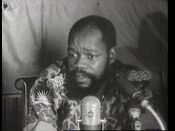
|
Artoir Adewale (1913-1994) |
1 October 1958 | 31 December 1978 | 7396 | U&P | 1958 |
| The leader of the Batisurian Peoples' Liberation Army during the Long War, Adewale was largely responsible for guiding the development of the early PDR and creating precedent for both the role of the President but also that of the government institutions to come. | |||||||
| 2 | 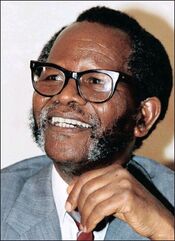
|
Muraty Khalfani (1928-) |
1 January 1979 | 31 December 1988 | 4017 | U&P | 1978 |
| Khalfani was the primary representative of U&P at the Second Constitutional Assembly in 1977-78, and a personal friend and confidant of Artoir Adewale, who saw him as an appropriate successor who would ensure the continued stability and improvement of the PDR over the 1980s, and more importantly, demilitarize society where his predecessor would not be capable. | |||||||
| 3 | 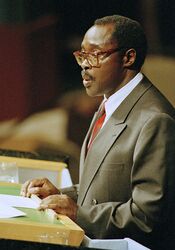
|
Sebastien Simba (1938-1992) |
1 January 1989 | 1 May 1992 | 1216 | U&P | 1988 |
| Despite his popularity, Simba met an unfortunate end when his convoy was ambushed en route to a May Day parade in the nation's capital. It was carried out by the Rashidin, an extremist militia affiliated with the Mamba Society, a highly secretive nationalist group and crime ring which seeks the expulsion of all non-indigenous persons from Enewatu, which they sought to turn into a sovereign state. Similar attacks were launched throughout the country over the following weeks to varying degrees of success, in a string of national tragedies known as "Bleeding May". | |||||||
| 4 | 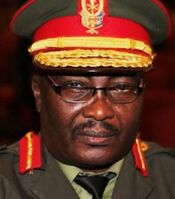
|
Moses Haoniyao Issa (1934-2009) |
3 May 1992 | 31 December 1992 | 242 | U&P | N/A |
| In the wake of Bleeding May, emergency powers were granted to the executive branch in the hands of General M.H. Issa, who was appointed following the resignation of Simba's Vice President, Kuende Abdullah, in order to give them the necessary authority to restore order, a move spurred by counsel with former president Artoir Adewale . The General enacted temporary martial law in many parts of the country in a bid to hunt down active separatist groups which attempted to take advantage of the destabilization brought about in 1992. A number of additional emergency measures were enacted to keep the nation's economy afloat, including an effort to redouble relationships with post-ASU states, especially Veleaz - a relationship which saw significant military support both overt and otherwise, including until-recently classified operations engaged by the Veleazean Regicidas alongside the BPDF and Mousquettaires-Federal against the surge in banditry and Mamba Society activity. | |||||||
| 5 | 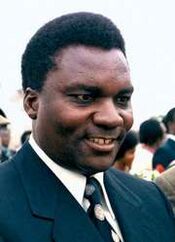
|
Kuende Abdullah (1950-) |
1 January 1993 | 31 December 1998 | 2190 | U&P | 1992 |
| Originally lauded as the "face of the new generation" in Marensoald, Abdullah was the first Irsadi to be elected to the Vice Presidency, and the first Nosian to reach the presidency. While more popular abroad for his more moderate approach to the nation's socialist policies and shrewdness, he was often seen as cold, manipulative, and disconnected from the concerns of the citizens in general. While largely successful in reining in the military's presence in the nation following the Issa administration, it and adjacent policies came at the cost of losing some of the ground gained towards the end of Operation Meridian against frontier banditry, a move which would later cost them his party's support in the rural districts and communes, and ultimately cost him the U&P Nomination to renew their term in 1998 in favor of his Home Minister, Clara Bonhomme. | |||||||
| 6 | 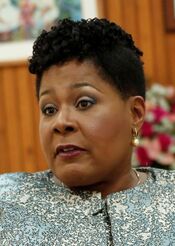
|
Clara Bonhomme (1949-2005) |
1 January 1998 | 4 March 2005 | 2619 | U&P | 1997 |
| The first female to hold the office, Bonhomme was lauded as a major social reformer and barrier-breaker. Making good at attempting to bring a close to the bloodshed in Enanulo, as well as pushing for military intervention in Mawusi, the Bonhomme administration made for the largest budget allocation in defense since the late Adewale years, outpacing even the Issa budget in terms of military spending. This, coupled with the surge of new recruits, gradually brought the wars in the Northeast to a close over the course of her time in office. Following the capture of Roland Msia in 2001 in conjunction with local rebels, Bonhomme personally worked in reorganization efforts of the Mawusi government, with military resources being devoted to relief and reconstruction in the worst-affected areas. Domestically, the "Iron Mother" is known for her uncompromising progressivism, and is especially beloved by the LGBTQ+ Community in Marensoald for passing a number of sweeping reforms to both legitimize non-traditional marriage and ensure their status as a protected class in the second half of her term in office. However, this meteoric time in office was cut short by a previously-undetected case of advanced-stage lung cancer in 2003, which despite numerous treatments and a slow withdrawal from public life, ended with her death in March of 2005. | |||||||
| 7 | 
|
Hakmana Dissanayake (1953-) |
11 March 2005 | 31 December 2008 | 1391 | U&P | N/A |
| 8 | 
|
Nisvanth Chellvan (1942-) |
1 January 2008 | 31 December 2011 | 1390 | U&P | 2007 |
| 9 | 
|
Dominique Jacquard (1939-) |
7 January 2012 | 31 December 2012 | 359 | Alternatif | N/A |
| 10 | 
|
Hugo Toutain (1939-) |
1 January 2013 | 31 December 2017 | 1825 | Alternatif | N/A |
| 11 | 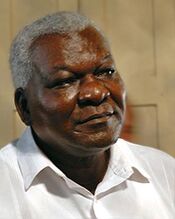
|
Laurence Jojomba (1940-) |
1 January 2018 | Incumbent | Incumbent | U&P | 2017 |
